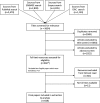Social media in knowledge translation and education for physicians and trainees: a scoping review
- PMID: 31834598
- PMCID: PMC7012997
- DOI: 10.1007/s40037-019-00542-7
Social media in knowledge translation and education for physicians and trainees: a scoping review
Abstract
Introduction: The use of social media is rapidly changing how educational content is delivered and knowledge is translated for physicians and trainees. This scoping review aims to aggregate and report trends on how health professions educators harness the power of social media to engage physicians for the purposes of knowledge translation and education.
Methods: A scoping review was conducted by searching four databases (PubMed, Scopus, Embase, and ERIC) for publications emerging between 1990 to March 2018. Articles about social media usage for teaching physicians or their trainees for the purposes of knowledge translation or education were included. Relevant themes and trends were extracted and mapped for visualization and reporting, primarily using the Cook, Bordage, and Schmidt framework for types of educational studies (Description, Justification, and Clarification).
Results: There has been a steady increase in knowledge translation and education-related social media literature amongst physicians and their trainees since 1996. Prominent platforms include Twitter (n = 157), blogs (n = 104), Facebook (n = 103), and podcasts (n = 72). Dominant types of scholarship tended to be descriptive studies and innovation reports. Themes related to practice improvement, descriptions of the types of technology, and evidence-based practice were prominently featured.
Conclusions: Social media is ubiquitously used for knowledge translation and education targeting physicians and physician trainees. Some best practices have emerged despite the transient nature of various social media platforms. Researchers and educators may engage with physicians and their trainees using these platforms to increase uptake of new knowledge and affect change in the clinical environment.
Keywords: Knowledge translation; Medical education; Social media.
Conflict of interest statement
T.M. Chan received the PSI Graham Farquharson Knowledge Translation Fellowship, which funded her work on this paper. K. Dzara, S. Paradise, A. Bhalerao and L.A. Maggio declare that they have no competing interests.
Figures



References
-
- Cadogan M, Thoma B, Chan TM, Lin M. Free Open Access Meducation (FOAM): the rise of emergency medicine and critical care blogs and podcasts (2002–2013) Emerg Med J. 2014;31(e1):e76–e77. - PubMed
-
- Choo EK, Ranney ML, Chan TM, et al. Twitter as a tool for communication and knowledge exchange in academic medicine: a guide for skeptics and novices. Med Teach. 2015;37:411–416. - PubMed
-
- Chan TM, Stukus D, Leppink J, et al. Social media and the 21st-century scholar: how you can harness social media to amplify your career. J Am Coll Radiol. 2017;15:142–148. - PubMed
-
- Dube L, Bourhis A, Jacob R. Towards a typology of virtual communities of practice. Interdiscip J Inf Knowl Manag. 2006;1:69–93.
-
- Dubé L, Bourhis A, Jacob R. The impact of structuring characteristics on the launching of virtual communities of practice. J Organ Chang Manag. 2005;18:145–166.
Publication types
MeSH terms
LinkOut - more resources
Full Text Sources
Medical

